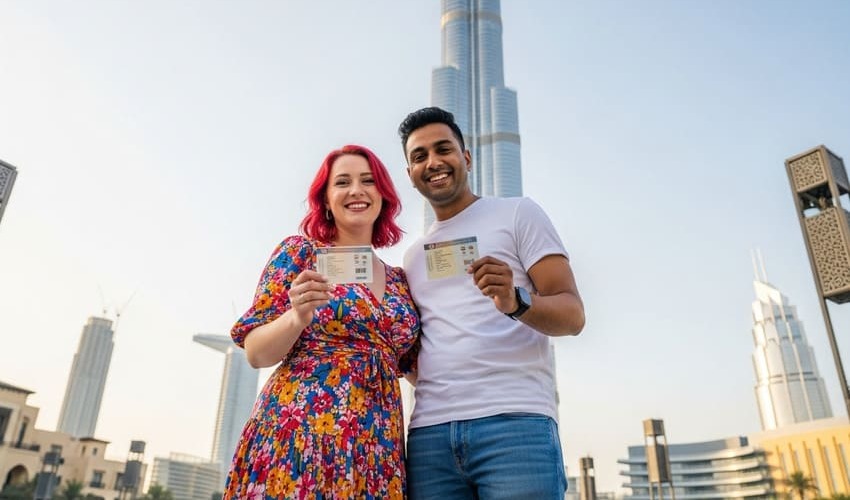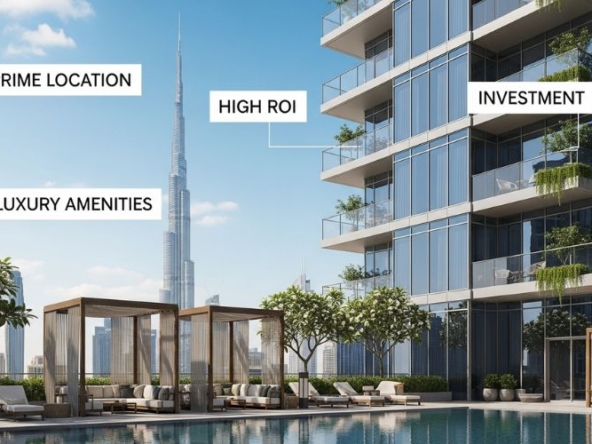Introduction to Dubai Visas
Dubai is a vibrant hub for global migrants—offering dynamic job opportunities, top-tier education, real estate investments, and a gateway to a high-end lifestyle. However, navigating the visa options can be overwhelming. This guide simplifies everything—from Dubai visa types and eligibility to application tips—so you can confidently make the right choice based on your goals.
We’ll introduce the main UAE residence visa types, outlining the key categories, durations, and eligibility criteria. You’ll learn about the differences between each visa and which one may best suit your needs.
Dubai stands out as a global destination for individuals and families seeking new opportunities, luxury living, and a thriving business environment. To legally reside in this dynamic city, securing a valid residence visa is essential. Issued by the General Directorate of Residency and Foreigners Affairs – Dubai (GDRFA), a Dubai residence visa opens the door to long-term living, working, and investing in the UAE.
The process typically starts with obtaining an entry permit, followed by medical tests and registration for an Emirates ID. There are several types of residence visas available, each tailored to different needs and backgrounds. Whether you’re considering a standard residence visa, aiming for the prestigious golden visa, exploring the flexible green visa, or planning for retirement with a retirement visa, understanding the eligibility criteria and application steps is crucial. Each visa type offers unique benefits and requirements, so knowing which one fits your goals will help you make a smooth transition to life in Dubai.
Residence Visa
- Eligibility: Employment, family sponsorship, or property ownership. A normal employment visa (also known as a standard work visa) is issued to employees in the private sector or free zones. The Ministry of Human Resources and Emiratisation is responsible for issuing work permits and managing employment-related visas. The resident visa is the official permit for expatriates to live in Dubai.
- Duration: Typically 2–3 years, renewable. A long term residence visa is also available for those seeking extended stays.
- Benefits: Free access to UAE banks, utilities, health insurance, and children’s education. Health insurance coverage is a mandatory benefit for all UAE residence visa holders.
- Cost: Employer-sponsored visas vary; property owners approximately 4%-5% of property value
There are several types of residence visas available, each tailored to different needs and backgrounds. Residency visas are the main permits for expatriates to live and work in Dubai. The official term is UAE residence visa, and it is required for legal residency.
The process typically starts with obtaining an entry permit, followed by medical tests and registration for an Emirates ID. An entry visa is required before applying for a residence visa. Some applicants may enter Dubai on an entry or tourist visa and later convert to a residence visa. A tourist visa can sometimes be converted to a residence visa if eligibility criteria are met.
Golden Visa
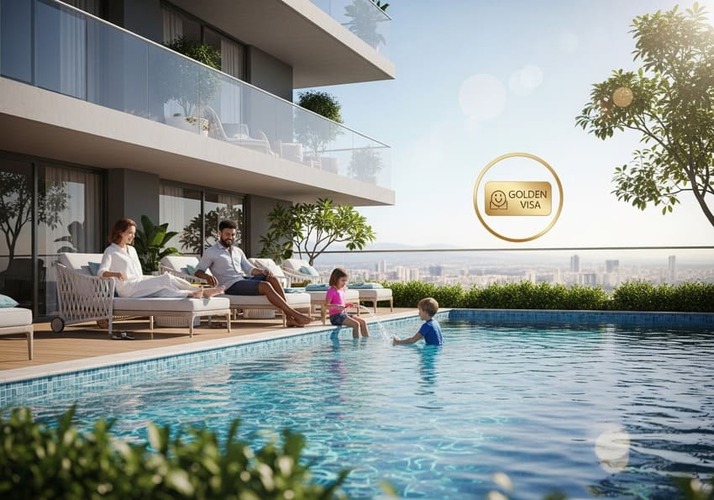
- Eligibility: Investors, professionals, elite students, scientists
- Validity: 10 years, renewable
- Benefits: Enables foreign talents such as professionals, entrepreneurs, and artists to live, work, and study in the UAE with special privileges; family sponsorship; sponsor an unlimited number of family members and domestic helpers; stay outside the UAE for extended periods without affecting visa validity; no need for a local sponsor; access to premium healthcare and education. While Golden Visa holders enjoy many rights, they are not UAE nationals and do not have citizenship status.
Green Visa
The Green Visa is a game-changer for those who want more independence and flexibility in the UAE. Unlike traditional residence visas, the green visa allows highly skilled professionals, investors, entrepreneurs, and students to self-sponsor their stay for up to five years—no need for a UAE national or employer as a sponsor. This makes it an attractive option for freelancers, self-employed people, and skilled employees who want to take control of their residency.
To apply for a green visa, you’ll need to meet specific eligibility criteria, which vary depending on your category. For example, highly skilled professionals must show proof of qualifications and a minimum monthly income, while freelancers and self-employed applicants need a freelance self employment permit and evidence of financial solvency. One of the standout benefits is the ability to sponsor family members, including spouses, children, and first-degree relatives, giving your loved ones the security of a residence permit as well. Plus, if your green visa expires or is cancelled, you get a generous six-month grace period to stay in the UAE and make new plans.
Investor Visa

- Eligibility: Mainland or Free Zone company owners with minimum capital investment. The Investor Visa is part of Dubai’s strategy to attract foreign investment and promote economic growth.
- Duration: Usually 3–6 years, renewable
- Benefits: Work permit-free, sponsor family and employees, ease of onshore/opportunity zone. The Investor Visa is designed to facilitate foreign investment by providing residency to international entrepreneurs and investors. As an alternative, the UAE Green Visa offers long-term residency for investors, as well as self employed people freelancers, allowing them to reside in the UAE without employer sponsorship.
Remote Work / Virtual Work Visa
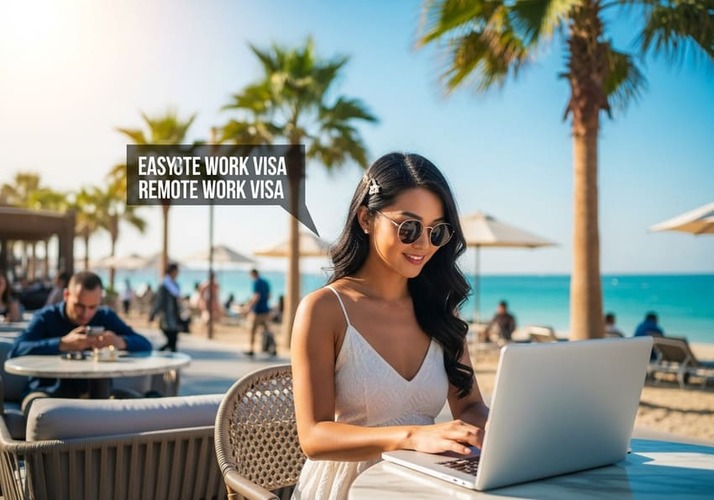
- Eligibility: Digital nomads and freelancers with a minimum monthly income. The freelance visa is another option for independent professionals who wish to live and work in Dubai without a traditional employer.
- Duration: Up to 1 year, renewable
- Benefits: Live in Dubai while working remotely, access to UAE amenities
Student Visa
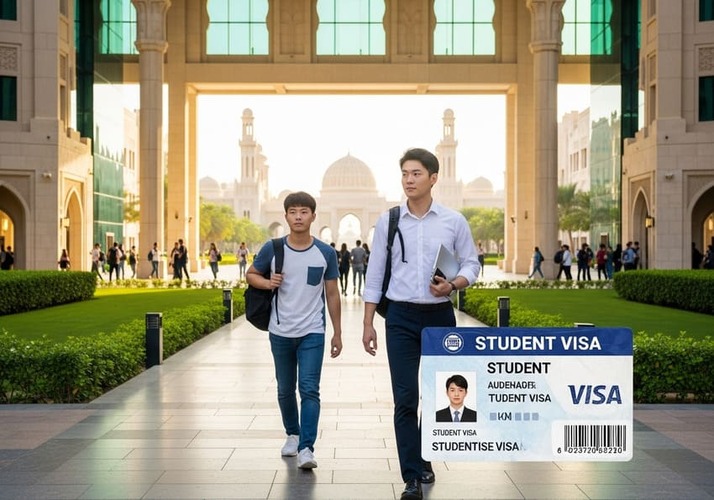
- Eligibility: UAE student visa students must be accepted into accredited educational institutions in the UAE
- Duration: Valid for the duration of your course
- Benefits: Permits part-time work, eligibility to switch to a work/residence visa after graduation
Job Seeker Visa
- Eligibility: Recent graduates and professionals seeking employment
- Duration: 60–90 days, non-renewable
- Benefits: Time to interview in-person without needing tourist stay
Family Sponsorship Visa
- Eligibility: UAE residents (residence/Golden/Investor visa holders). The Family Sponsorship Visa, also known as the UAE family visa, requires the sponsor to meet certain income and accommodation criteria. Eligible family members include spouse, children, and parents.
- Benefits: Sponsor spouse, children, and parents
Bonus: Transit & Visit Visas
Short-term options include:
- 48-hour visa: immediate airport retention
- 30-day single-entry: from arrival date
- 90-day multi-entry: tourist/business purposes
Entry Permit
Before you can obtain a residence visa and start your new life in Dubai, you’ll need an entry permit. This official document, issued by the General Directorate of Residency and Foreigners Affairs – Dubai (GDRFA), allows you to legally enter the UAE for a specific purpose—whether it’s for work, joining a family member, or simply visiting. Entry permits are typically valid for 60 days, giving you enough time to complete the next steps for your residence visa.
Entry permits come in several types, including employment entry permits (sponsored by your employer), family entry permits (sponsored by a family member or UAE national), and tourist entry permits. Each type has its own eligibility criteria and documentation requirements, so it’s important to choose the right one for your situation. Once you’re in the UAE with a valid entry permit, you can proceed with the residence visa application process and officially become a Dubai resident.
Emirates ID
The Emirates ID is your official identity card in the UAE, issued by the Federal Authority for Identity, Citizenship, Customs and Port Security (ICP). It’s mandatory for all Dubai residents and citizens, and you’ll need it for everything from opening a bank account to accessing government services.
This smart card contains your personal details, biometric data (like your photograph and fingerprints), and a unique identification number. The Emirates ID is a key part of your residency status, serving as proof of your legal presence in the UAE and making everyday transactions smoother and more secure.
Comparison Table
| Visa Type | Validity | Eligibility | Best For… |
|---|---|---|---|
| Residence | 2–3 years | Employees, property owners | Long-term living & work |
| Golden | 10 years | Investors, scientists, top talent | High stability & benefits |
| Investor | 3–6 years | Business owners/investors | Entrepreneurs & SMEs |
| Remote Work | 1 year | Digital nomads, freelancers | Remote workers seeking base |
| Student | Course-term | University students | Education & part-time access |
| Job Seeker | 60–90 days | Graduates/job seekers | Interview visits & job hunting |
| Family | 1–3 years | Sponsored dependents | Residents’ immediate family |
Comparison of main UAE residence visa types: This table outlines the different categories, durations, and eligibility criteria for the most common UAE residence visa types.
Eligibility Criteria
Understanding the eligibility criteria for residence visas in Dubai is the first step toward a successful application. Each visa category has its own set of requirements based on your purpose of stay. For employment-based residence visas, you’ll need a valid employment contract, meet minimum salary thresholds, and have the necessary qualifications or experience. If you’re applying for a family visa, your sponsor must demonstrate sufficient income and suitable accommodation to support family members.
Investors and entrepreneurs must meet specific financial and business requirements, such as minimum investment amounts or ownership in a UAE-registered company. Students seeking a student residency visa must be enrolled in an accredited educational institution and fulfill academic standards. By carefully reviewing the eligibility criteria for your chosen visa type, you can ensure a smoother application process and increase your chances of securing your Dubai residence visa.
How to Choose the Right Visa
- Purpose: Work, study, invest, retire?
- Length: Permanent stay needs long/Golden visas
- Eligibility: Know the income/property/investment criteria
- Budget: Consider financial and legal costs
Application Process
- Select visa type
- Gather documents (passport, photos, health, police clearance, financials, birth certificate for family or child visa applications). For retirement visa applicants, proof of a fixed annual income is required. Some documents may need to be attested by the relevant foreign affairs authority.
- Medical screening & Emirates ID
- Submit via GDRFA/DNRD or through licensed agencies. Ensure all required documents, including those attested by foreign affairs, are included.
- Stock common pitfalls: expired documents, wrong form, applicant misclassification
- Receive visa and update Emirates ID
FAQ’s
1. What types of visas can I get for Dubai?
Dubai offers multiple visa options including various residency visas such as Residence Visa, Golden Visa, Investor Visa, Green Visas (for high-skilled workers, investors, and self-employed individuals), Remote Work Visa, Student Visa, Job Seeker Visa, Family Sponsorship Visa, and short-term Visit/Transit Visas. Each residency visa category has specific eligibility criteria and benefits for expatriates.
2. Who is eligible for a Dubai Golden Visa?
Eligibility includes investors, real estate developers, high‑achieving students, researchers, doctors, and top‑tier professionals. It provides a 10-year residency and family sponsorship without needing a local sponsor.
3. Can I buy property in Dubai and get a visa?
Yes. Property owners meeting the minimum investment threshold (typically AED 750k–1m+) may qualify for a property-backed Residence Visa, and investing larger amounts could potentially qualify them for a long-term Golden Visa.
4. How long does a Remote Work Visa last in Dubai?
The Remote Work / Virtual Work Visa is valid for up to 1 year and can be renewed. It’s designed for remote employees and freelancers who want to live in Dubai while working abroad.
5. Can I change my visa type after arriving in Dubai?
Yes. Many visa types can be converted—for example, from a Student or Job Seeker Visa to a Work or Residency Visa—by meeting the eligibility criteria and following the required application steps.
6. What is the eligibility for a Student Visa in Dubai?
To get a Student Visa, you must be accepted into a UAE-recognized educational institution. It also allows part-time work during studies and provides an option to switch to a work or residence visa later.
7. What is the Job Seeker Visa and how long is it valid?
A Job Seeker Visa allows professionals and recent graduates to stay in Dubai for 60–90 days to attend interviews and explore job opportunities. It’s ideal for those in transition.
8. Can I sponsor my family with my visa?
Yes. Visa holders such as Property-Backed, Residence, Golden, and Investor Visa holders can sponsor their spouse, children, and eligible dependents under the Family Sponsorship Visa, subject to income and accommodation requirements.
9. How long does it take to process Dubai visas?
Processing times vary by visa type. UAE residence visas can take 5–15 working days; Golden and Investor Visas can take 2–4 weeks; Student and Job Seeker Visas may take 1–3 weeks. Remote Work Visas typically process in 5–10 days.
10. Do I need a local sponsor for a Dubai visa?
Employment and Family Sponsorship Visas generally require a UAE-based sponsor. However, Golden, Investor, Green Visas, and Remote Work Visas do not require a local sponsor and allow self-sponsorship.
11. What is a UAE residence visa?
A UAE residence visa is the main permit that allows expatriates to legally reside, work, and access services in the UAE. It is available in several categories, including long term residence visas such as the Golden Visa and Green Visa, each with specific eligibility and benefits.
12. What is a long term residence visa and what are its benefits?
A long term residence visa, such as the Golden Visa or Green Visa, allows eligible individuals to stay in Dubai for 5 or 10 years. Benefits include extended residency, the ability to sponsor family members, and greater flexibility for work and investment.
13. What is the UAE retirement visa and who is eligible?
The UAE retirement visa is a special 5-year visa for individuals aged 55 and above. Eligibility typically requires proof of financial stability, such as a minimum monthly income, savings, or real estate investment in Dubai. This visa allows retirees to reside in the UAE and enjoy long-term benefits.
Conclusion
Dubai’s visa system is built for diverse aspirations—whether to live, invest, study, or work. Start by defining your goals, then use this guide as a map. Need help? Contact Splendor for expert support on eligibility checks, document prep, and streamlined application.

